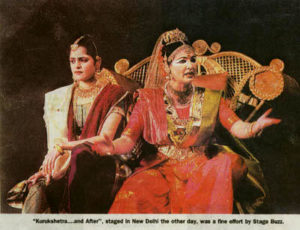CITY ABUZZ
HINDU
FRIDAY REVIEW
Delhi abuzz with Stage Buzz
ROMESH CHANDER comes back happy and at peace after watching “Kurukshetra … and After”., taged in New Delhi this past week….
Kurukshetra …. and After”, staged In New Delhi the other day, was a fine effort by Stage Buzz.
We are familiar with the writings of some of the poets, novelists and short_ story writers in the Indian Foreign Service but in “Kurukshetra …. and After”, presented in New Delhi by the Delhi Tourism Development Corporation in association with the Ministry of Tourism and Culture and Stage Buzz we met for the first time Kanthi Tripathi the only playwright among them. The presentation was not only a premier for the playwright but also for Stage Buzz, a new amateur theatre group of some seasoned performers of the English stage in the Capital working with Manohar Khushalani, an experienced actor director. “Kurukshetra … and After” holds much promise both for the playwright and Stage Buzz.
The play is set in the ancient city of Hastinapur just after the end of the war between the Kauravas and the Pandavas, as told in the Mahabharat and underlines its devastating impact, particularly on women. To bring the point
home the playwright builds her play around three women of the great epic: Gandhari, the mother of hundred Kauravas, Kunti, the mother of five Pandavas as also Karna, who fought for the Kauravas and Panchali, wife of the five Pandava brothers. As the action
the Mudras for gestures. Since death is ever present in the play Khushalani has made effective use of masks at places and since most of the cast has had professional training in different Indian dance forms, the director has exploited their talent to the fullest and we have some very interesting dance sequences choreographed by Rashmi Vaidialingam and Ruchita Puri that provide aesthetic interpretation of an event or what the playwright wants to communicate as for instance in the death dance that had 18 different parts. Then again, the masks used by the maids mocked what the royal ladies were saying. Yet another interesting projection was that of cheerharan after the Pandava brothers lost in the dice game of chaupt. Though Stage Buzz is an amateur group and most of the cast is working in different professions, their performance is quite good. Rashmi Vaidialingam, whom we have seen in quite a few plays, is an experienced actress and her enactment of Gandhari was excellent in her measured speech that projected her inner turmoil. The two maids, Nidhi Sharma and Shreya Sharma, with brisk movements and tongue in cheek lines were a delight to watch. Charu Malhotra’s performance as Kunti made a perfect mother of her Pandava sons and while speaking of Karan, also her son, the change in her mode and tone was remarkable.Ruchita Puri playing as Panchali stands out in the dance sequences as also her movement and gait that has marked Kathak characteristics.The presentation created not only the mood of the period but also poetically brought home Kanthi Tripathi’s message.
